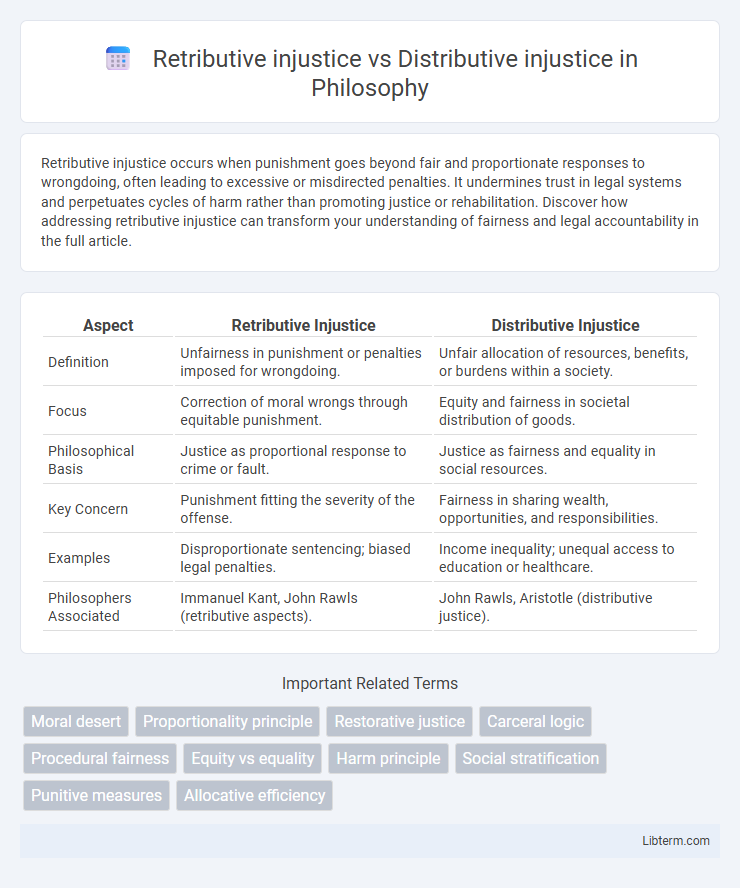Retributive injustice occurs when punishment goes beyond fair and proportionate responses to wrongdoing, often leading to excessive or misdirected penalties. It undermines trust in legal systems and perpetuates cycles of harm rather than promoting justice or rehabilitation. Discover how addressing retributive injustice can transform your understanding of fairness and legal accountability in the full article.
Table of Comparison
| Aspect | Retributive Injustice | Distributive Injustice |
|---|---|---|
| Definition | Unfairness in punishment or penalties imposed for wrongdoing. | Unfair allocation of resources, benefits, or burdens within a society. |
| Focus | Correction of moral wrongs through equitable punishment. | Equity and fairness in societal distribution of goods. |
| Philosophical Basis | Justice as proportional response to crime or fault. | Justice as fairness and equality in social resources. |
| Key Concern | Punishment fitting the severity of the offense. | Fairness in sharing wealth, opportunities, and responsibilities. |
| Examples | Disproportionate sentencing; biased legal penalties. | Income inequality; unequal access to education or healthcare. |
| Philosophers Associated | Immanuel Kant, John Rawls (retributive aspects). | John Rawls, Aristotle (distributive justice). |
Introduction to Retributive and Distributive Injustice
Retributive injustice centers on unfair punishment or penalties imposed on individuals or groups, often reflecting a failure in justice systems to balance crime and punishment appropriately. Distributive injustice refers to the unequal allocation of resources, opportunities, or rights, leading to systemic disparities across social, economic, or political domains. Understanding both types is crucial for addressing structural inequalities and promoting equitable legal and social frameworks.
Defining Retributive Injustice
Retributive injustice occurs when punishment or reparation is unfairly administered, violating principles of proportionality and justice by imposing excessive or insufficient penalties for wrongdoing. It contrasts with distributive injustice, which concerns the unfair allocation of resources, wealth, or opportunities within a society. Understanding retributive injustice requires examining how legal and moral systems fail to balance accountability with equitable treatment of offenders.
Understanding Distributive Injustice
Distributive injustice arises when resources, opportunities, or wealth are allocated unfairly among individuals or groups, leading to social and economic disparities. This type of injustice affects access to essential goods such as education, healthcare, and employment, often perpetuating systemic inequality. Understanding distributive injustice requires analyzing the structural mechanisms and policies that cause unequal distribution and addressing these through equitable frameworks and reforms.
Key Differences Between Retributive and Distributive Injustice
Retributive injustice centers on unfair punishment or retaliation disproportionate to the offense, emphasizing moral blame and correction through sanctions. Distributive injustice involves unequal allocation of resources or opportunities, leading to systemic inequality and social disparities. Key differences lie in retributive injustice addressing individual wrongdoing and punishment, while distributive injustice targets structural imbalances in economic or social distributions.
Historical Perspectives on Injustice
Historical perspectives on retributive injustice emphasize the disproportionate punishment often meted out to marginalized groups, reflecting power imbalances in legal systems. Distributive injustice historically manifests through unequal allocation of resources and opportunities, evident in systemic racial, economic, and gender disparities. These patterns reveal entrenched societal structures that perpetuate inequality through both punishment and resource distribution across different eras.
Social Implications of Retributive Injustice
Retributive injustice, characterized by disproportionate or unfair punishment, erodes social trust and exacerbates inequalities within communities. It often intensifies social tensions by reinforcing feelings of marginalization and systemic bias against specific groups. The resulting social fragmentation can lead to decreased civic engagement and increased support for radical or extrajudicial responses to perceived injustices.
Economic Consequences of Distributive Injustice
Distributive injustice results in unequal resource allocation, leading to significant economic disparities and decreased social mobility within affected populations. These economic consequences include reduced access to education, healthcare, and employment opportunities, which perpetuate poverty cycles and hinder overall economic growth. In contrast, retributive injustice primarily concerns punishment and legal consequences rather than systemic economic inequality.
Case Studies: Examples from Law and Society
Retributive injustice occurs when punishment is disproportionately harsh or unjustly applied, as seen in cases of wrongful convictions where innocent individuals receive severe sentences, such as the Central Park Five case in the United States. Distributive injustice involves the unfair allocation of resources or opportunities, exemplified by systemic disparities in access to legal representation, highlighted by the Flint water crisis where marginalized communities lacked equal protection. Both types of injustice reveal structural flaws in legal and social institutions that perpetuate inequality and undermine trust in justice systems.
Addressing and Reducing Injustice
Addressing retributive injustice requires reforming punitive systems to ensure fair treatment, proportional penalties, and restorative justice approaches that prioritize rehabilitation over punishment. Reducing distributive injustice involves implementing equitable resource allocation policies, social welfare programs, and economic reforms aimed at closing wealth gaps and increasing access to opportunities for marginalized populations. Both approaches demand systemic changes, data-driven policies, and inclusive decision-making processes to promote fairness and social cohesion effectively.
Conclusion: Moving Towards Justice
Addressing retributive injustice involves ensuring fair punishment proportional to offenses, while tackling distributive injustice requires equitable allocation of resources and opportunities. Moving towards justice demands integrating both principles to create systems that uphold accountability and promote social equity. Sustainable justice emerges from balancing punitive measures with policies that correct structural inequalities, fostering a society based on fairness and human dignity.
Retributive injustice Infographic

 libterm.com
libterm.com